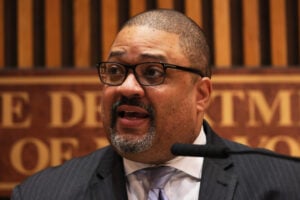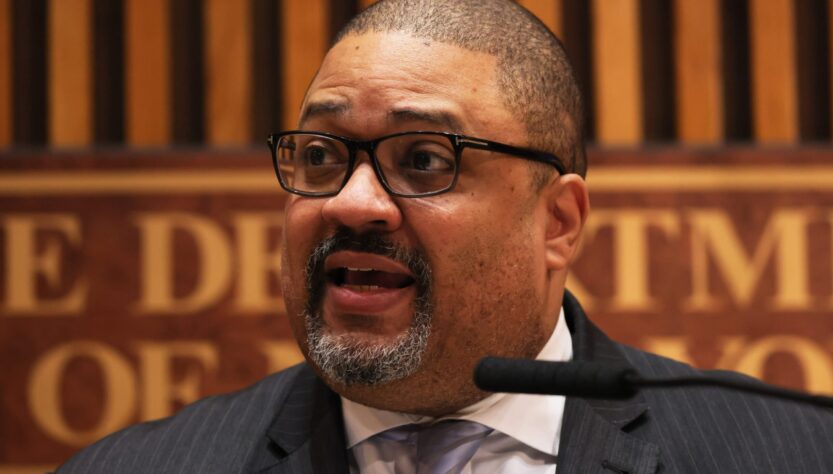
Manhattan DA Alvin Bragg (Photo by Michael M. Santiago/Getty Images)
In a typical case involving the Manhattan district attorney and a billionaire defendant, there would be discussions about a plea bargain.
The DA might figure that business records charges are usually misdemeanors, and it’s a bit of a stretch to turn those crimes into felonies. A first-time defendant convicted of a business records offense in New York would never do jail time. The DA might thus propose that the billionaire plead guilty to one felony count, and the billionaire would be guaranteed no jail time.
The typical billionaire would then accept that deal. The case against the billionaire looks strong; most criminal defendants are convicted; the plea deal involves only one count and no jail time.
Case closed.
Could that deal happen in the case of New York v. Trump?
There are, of course, two sides in any plea negotiation.
Could District Attorney Alvin Bragg offer the deal? He should: Justice would arguably be done; Trump would plead guilty to a felony.
Bragg would not get the opportunity to try the case, which means that Bragg would not be able to make public certain evidence that might embarrass Trump. But that’s okay: When making prosecutorial decisions, prosecutors aren’t supposed to be thinking about whether they could embarrass a defendant.
If Bragg settled the case without a trial, he wouldn’t run the risk of a MAGA diehard on the jury refusing to vote to convict Trump. A hung jury would be a public relations godsend for Trump and a massive humiliation for Bragg. It should be worth a fair amount to Bragg to avoid that possibility.
What about the other side of the plea negotiation — could Trump accept the deal? Trump is about to be convicted of a bunch of felonies. Pleading guilty to just one count, and avoiding all jail time, might sound pretty sweet.
Trump could probably convince voters that he had no choice but to accept the deal: “There’s no way I could get a fair trial in front of this corrupt judge and a Manhattan jury! They were going to convict me, and I would have been able to reverse that conviction only on appeal! Besides, the trial would have kept me off the campaign trail for six weeks, and it’s crucial that I campaign and be elected your next president! The country can’t survive another four years of Biden!”
There might, however, be a few flies in the ointment. There’s a question about what Trump would have to admit in court for the plea deal to be accepted. Trump might have to stand before a New York judge and say, basically, “I admit that I fraudulently altered the books of The Trump Organization to conceal a payment I made to Stormy Daniels. That payment was intended to keep Stormy Daniels from disclosing in the days leading up to the 2016 election the affair I had with Daniels years earlier. I feared disclosure of that affair might have caused me to lose the presidential election.”
Those words, and the illustrations drawn by the courtroom sketch artists showing Trump in the well of a courtroom confessing his guilt to Judge Juan Merchan, might be too much for Trump to bear. The words would undercut any claim that Trump hadn’t committed a crime, and the image of Trump humbling himself before a judge might scar Trump’s tender psyche.
If, however, Merchan permitted Trump to insist that Trump was not actually guilty and was pleading guilty only to avoid a possible longer sentence after trial, the plea deal would become more palatable. (I’m no expert in New York criminal law, or Merchan’s preferences, so I really don’t know what Trump might have to say in connection with any plea bargain.)
Psychologically, of course, Trump would hate the idea of having been a loser in a criminal case. But not having to admit that he’d violated the law, avoiding any possible jail time, and being released from spending six weeks in the dock in a New York courtroom, might be a fair tradeoff.
Then, of course, there are the ads that the Biden campaign would run to capitalize on Trump’s conviction. “Donald J. Trump, a convicted felon, has lost the right to vote in the coming election. He can’t even vote for himself. But the felon wants to be president; he wants to be responsible for enforcing the laws of the country. Don’t put a criminal in charge of law enforcement. Make America sane again; refuse to vote for the convicted felon. I’m Joe Biden, and I approve this message.” Or words to that effect.
I’m not sure that Bragg could offer this deal. I’m not sure that Trump could accept it.
But discussions of this sort would surely occur in a normal case. It’s fair to consider how those discussions would play out in this one.
Mark Herrmann spent 17 years as a partner at a leading international law firm and is now deputy general counsel at a large international company. He is the author of The Curmudgeon’s Guide to Practicing Law and Drug and Device Product Liability Litigation Strategy (affiliate links). You can reach him by email at inhouse@abovethelaw.com.

